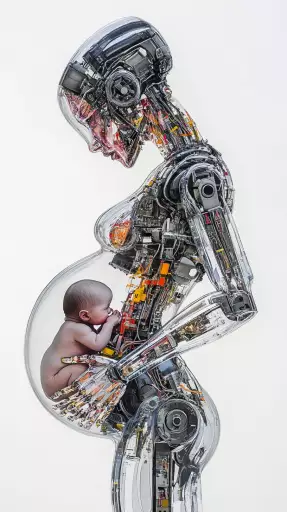Explore the Best AI Image Gallery

Quantum Leaps: How Quantum Computing is Reshaping the Creative Landscape
The realm of creativity is on the cusp of a profound transformation, driven by the burgeoning field of quantum computing. This revolutionary technology, harnessing the enigmatic principles of quantum mechanics, promises to unlock unprecedented capabilities, redefining artistic expression, design innovation, and storytelling in ways we can only begin to imagine.
While still in its nascent stages, quantum computing has already demonstrated tantalizing glimpses of its potential impact on the creative industries. Lets delve into some groundbreaking applications:
Quantum-Powered Design: A New Dimension of Creativity
Designers and artists are poised to embrace a paradigm shift with quantum algorithms capable of simulating complex systems and generating novel solutions. Imagine architects crafting intricate structures with unparalleled precision, fashion designers weaving fabrics with mesmerizing patterns, or product developers conceiving objects with optimized functionality. Quantum simulations can analyze vast datasets, identify patterns, and generate innovative designs that transcend the limitations of traditional methods.
Unleashing Artistic Potential: Generative Art at Quantum Speed
Quantum computings ability to process immense amounts of data opens up exciting possibilities for generative art. Imagine algorithms capable of producing intricate paintings, mesmerizing sculptures, or captivating musical compositions based on user-defined parameters. Artists can collaborate with quantum computers to explore new creative frontiers, pushing the boundaries of artistic expression and generating truly unique masterpieces.
Quantum Storytelling: Immersive Experiences Beyond Imagination
Storytelling is set for a revolution with quantum computings potential to create immersive and interactive experiences. Imagine interactive narratives that adapt in real-time based on user choices, or virtual worlds where characters and environments respond dynamically to the presence of viewers. Quantum technologies can enhance storytelling by creating engaging multisensory experiences, blurring the lines between fiction and reality.
Ethical Considerations: Navigating the Uncharted Waters
As with any groundbreaking technology, quantum computing raises important ethical considerations that must be carefully addressed. The potential for bias in algorithms, the ownership of intellectual property generated by quantum systems, and the impact on human creativity are just some of the complex issues that require thoughtful discussion and regulation.
Its crucial to ensure that quantum computing is used responsibly and ethically, promoting fairness, transparency, and accountability. Collaboration between technologists, ethicists, policymakers, and artists is essential to navigate these uncharted waters and harness the transformative power of quantum computing for the betterment of society.
Future Trends: Quantum Creativity on the Horizon
The future of creative industries lies at the intersection of quantum computing and human ingenuity. As quantum technologies continue to advance, we can expect even more groundbreaking applications that will redefine our understanding of art, design, and storytelling. Imagine:
- Quantum-powered AI assistants that collaborate with artists to generate new ideas and concepts
- Personalized artistic experiences tailored to individual preferences and emotions
- Global creative communities connected by quantum networks, fostering collaboration and innovation on a global scale
The possibilities are truly limitless. Quantum computing holds the key to unlocking unprecedented levels of creativity and innovation, paving the way for a future where art, design, and technology converge in harmonious synergy.

](https://images.ai-img.art/thumbnails/150/24923a08277bc0d1c7a9581472f42b8f1ecb5d1060d2e00c192533cd8ccf7f05.webp)












](https://images.ai-img.art/thumbnails/150/baffcf49dda195ed88eb109d62031bb483e314a94f1a665f889c6bd41b52f7b2.webp)


](https://images.ai-img.art/thumbnails/150/fce62c4116e8ab176f346542ad384a3f08ded74881bd6c4d9465812a98d8963b.webp)







](https://images.ai-img.art/thumbnails/150/be741cf174069af70d6024cd8068486bb0e105a3407dced31453a7f34a8a81c0.webp)





